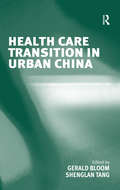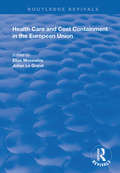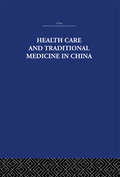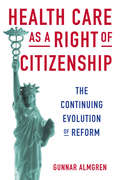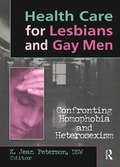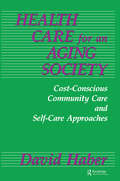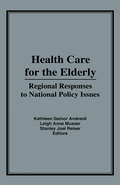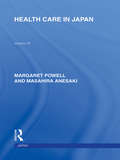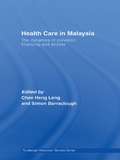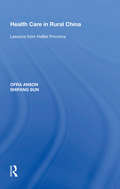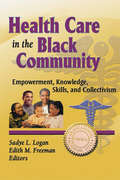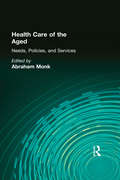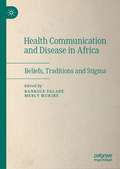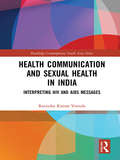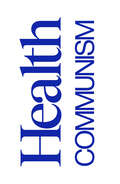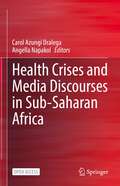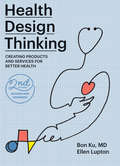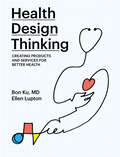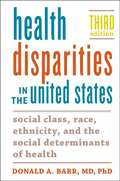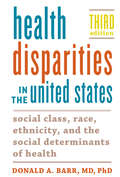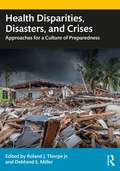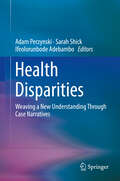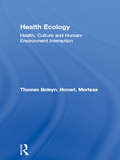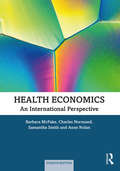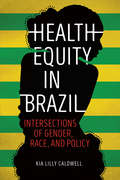- Table View
- List View
Health Care Transition in Urban China
by Shenglan TangThe on-going transition to a market economy in China is having a profound effect on health services. As a result, the government has made health one of the key policy areas, and there is now a general recognition of the need to reform urban health services. Multidisciplinary in scope, this exceptional volume draws on a prestigious report to explore how changes in health finance have affected the performance of urban health services in terms of equity and efficiency. Based on empirical evidence from the cities of Nantong, Jiangsu Province and Zibo, Shandong Province (selected for their innovative approach to health system development), the book offers an in-depth understanding of the relationship between transition, health reform and health system performance in urban settings. It features collaboration between European and Chinese academics and Chinese practitioners and officials, providing valuable background and contextual information on a complex system of healthcare, and presenting an analysis of policy impact and likely future direction.
Health Care and Cost Containment in the European Union (Routledge Revivals)
by Julian Le Grand Elias MossialosFirst published in 1999, this volume aims to describe and analyse the experience of cost containment in Europe over the last fifteen years in order to understand that experience and to determine, as best we can, which methods were successful and which were not. Part I provides an overview of healthcare in the European Union, an overview of recent expenditure trends. Part II complements the first, examining in detail cost containment policies in each EU Member State. The country-based chapters refer to developments up to mid-1997.
Health Care and Traditional Medicine in China 1800-1982
by S. M. Hillier Tony JewellFirst published in 1983.Beginning with the period of the early expansion of Western missionary medicine, this account covers the chaotic years of Nationalist rule to the foundations of the People's Republic in 1949. It trances the major influences on health care since then and describes the conflicts of State bureaucracy, Party and medical profession in their attempts to match political objectives in health care to resources available. An outline of the theory of Chinese traditional medicine, together with detailed accounts of acupuncture and plant drugs are also discussed, as are specific features of the health care system, such as population control, medical education, nutrition and psychiatry.
Health Care as a Right of Citizenship: The Continuing Evolution of Reform
by Gunnar AlmgrenWhile the Obama administration's Patient Protection and Affordable Care Act (ACA) has expanded health care coverage for millions of Americans, it has fallen short in offering universal health care to all. In Health Care as a Right of Citizenship, Gunnar Almgren argues that the ACA's primary significance is not in its expansion of health care entitlements but in its affirming by an act of Congress the idea that comprehensive health care must be available to all as a right of citizenship. The mainstream American public now views access to affordable health care to all citizens as a crucial function of just and effective governance—and any proposed alternative to the ACA must be reconciled with that expectation. This ambitious book examines how the American health care system must be further reformed to bring it closer in line with the ideals of a modern democracy, as well as how the ACA may change in the coming years. It suggests the next, natural step in the realization of health and well being as a fundamental human right.Based on a close analysis of the writings of sociologist TH Marshall and philosopher John Rawls, this book examines the theoretical foundations for health care as a social right of citizenship. Almgren then translates these theoretical principles into core health care policy aims. Throughout, he argues that the ACA is but an evolutionary step toward a more radical and fundamental health care reform. Almgren suggests how such a restructured health care system might operate, with specific proposals for its financing and delivery systems. He also explores the special issues and considerations that all nations must grapple with as they seek to provide a sustainable social right to health care. Health Care as a Right of Citizenship will stimulate and challenge readers who take an interest in America's health care policy, particularly those who wish for a health care system that is both financially sustainable and capable of making healthcare accessible, adequate, and affordable to all Americans, irrespective of their societal position and individual health needs.
Health Care for Lesbians and Gay Men: Confronting Homophobia and Heterosexism
by K Jean PetersonHealth Care for Lesbians and Gay Men educates practitioners about the special needs of gay and lesbian patients and how to look critically at the impact of homophobia and heterosexism on the provision of care. It provides an overview of critical health care issues for lesbians and gay men and offers concrete suggestions to health practitioners and social workers on how to address these issues in order to guarantee the best care for their patients and clients. Authors in Health Care for Lesbians and Gay Men give health care providers and mental health workers practical interventions; suggestions for advocacy, social change, grassroots efforts, and alternative programs; and lessons about how to use existing procedures to more effectively meet the unique health care needs of gays and lesbians. Practitioners also learn how to utilize legal action in securing and protecting patients’and clients’personal health care wishes. Chapters in this book cover: how homophobia and negative attitudes can directly compromise the care given to lesbians and gay men. heterosexism and biases which exclude the partners of gay men and lesbians from participating in the care of their loved ones. legal issues and the need for legal recognition of gay and lesbian relationships, both to enhance the provision of care and for financial access to health care presently available to only heterosexual, married couples. legal protection and special legal documents that ensure that the wishes of gay men and lesbians are honored and the integrity of their relationships not violated.Health Care for Lesbians and Gay Men starts with special issues confronting adolescents and the special role health care providers can play in supporting the struggles of lesbian and gay adolescents. It then continues to look at these issues over the life cycle. Three themes emerge as authors try to explain problems and possible solutions for lesbians and gay men seeking health care: the pervasive homophobia and heterosexism found throughout the health care system and the impact these attitudes and beliefs have on the health care of lesbians and gay men; the need for education in professional programs on special health issues of gay men and lesbians; and the critical role that social workers can play in both educating others about the special needs of their gay and lesbian clients and in advocating for their clients in various health care settings.Health Care for Lesbians and Gay Men is essential reading for social work and social service practitioners and students working in the health care field, advanced undergraduates and graduate students of social work, professionals and students of nursing and medicine, and others concerned with the quality and equality of health care services. It urges students and professionals to challenge and evaluate their own attitudes, beliefs, and behaviors in order to ensure quality services to all clients and patients.
Health Care for an Aging Society: Cost-Conscious Community Care and Self-Care Approaches (Death Education, Aging and Health Care)
by David HaberFirst published in 1989. Routledge is an imprint of Taylor & Francis, an informa company.
Health Care for the Elderly: Regional Responses for National Policy Issues
by Faan Mph Stanley Joel Reiser Kathleen Gainor Andreoli Dsn Leigh Anne MusserLeading experts in health policy, gerontology, economics, and ethics explore the potential impact of the growing number of elderly on our health care system. They provide valuable information on the continuing debate over national health care policy for the elderly versus a more decentralized.
Health Care in Japan (Routledge Library Editions: Japan)
by Margaret Powell Masahira AnesakiIn the 1970s and 80s Japan experienced some deep-rooted social changes which affected attitudes to health care services among both professionals and consumers alike. Health Care in Japan provides an introduction to and overview of health and medical services in Japan at that time. It describes the historical development of modern medical care; the social, political, and cultural factors which have influenced the development of the system for the provision of health and medical services. It also discusses and analyses those aspects of the health care system which are of concern to the government and assesses how the existing system of health care will meet the needs of Japanese society in the future.
Health Care in Malaysia: The Dynamics of Provision, Financing and Access (Routledge Malaysian Studies Series #Vol. 4)
by Chee Heng Leng Simon BarracloughThe health care system in Malaysia has undergone a fundamental transformation over the last two decades. This book examines this transformation and explores the pressing issues it faces today. It includes coverage of: the evolution of the system since independence, from the colonial legacy of national provision bequeathed from the British to the impact of the global ideological shift against statism in the 1980s considers the responses of the Malaysian state and government policy issues such as equity of provision, women's access to health care, HIV-AIDS health care, care for the elderly. The book offers a detailed examination of the changing face of health care in Malaysia, and its impact on Malaysian citizens, users and society.
Health Care in Rural China: Lessons from HeBei Province
by Ofra Anson Shifang SunThis work examines health, defined in its broadest meaning, in rural China today. It explores the current social distribution of health status, health behaviour and health care and the processes by which these came about. By exploring universal questions in the social, historical and political context of rural China, the authors advance our understanding of the social processes which shape the social distribution of health and health care, and draw policy implications for both post-industrial and developing societies. Using rural China as a case study, three main issues are addressed: � The role of ideology, politics and economic processes in shaping access to health and health care for the rural population; � The behaviour patterns of lay persons and health professionals and the degree to which they are influenced by specific social context; � Patterns of health inequalities and the distribution of health services. The book will be a useful reference for students, researchers and policy makers with an interest in health care in developing as well as post-industrial societies.
Health Care in the Black Community: Empowerment, Knowledge, Skills, and Collectivism
by Sadye Logan Edith M. FreemanEmpower patients with culture-specific strategies for promoting health, treating disease, and preventing violence!Current reports show that Black Americans have the highest death rate of all racial and ethnic groups. They suffer disproportionately from a number of fatal diseases, including hypertension, diabetes, and certain cancers. Moreover, violence takes far too high a toll, especially among young Black men. Clearly a different approach to health education and promotion is needed to end this tragic waste of valuable human lives. Health Care in the Black Community: Empowerment, Knowledge, Skills, and Collectivism proposes an innovative model for health professionals working in the Black community.Traditional Western medicine focuses on sickness, the isolated individual, and the material world. However, the Afrocentric values of many Black people emphasize wellness, the community, and the spiritual world. By basing health care approaches on the community's positive values of holistic healing and mutual assistance, Health Care in the Black Community suggests practical, effective strategies for promoting physical and emotional wellness. This comprehensive and informative book offers a solid intellectual framework as well as practical advice. Health Care in the Black Community: identifies deeply held African-American cultural traditions and attitudes offers specific suggestions for combining health care priorities with respect for cultural concerns shows how to gain compliance by involving patients in their own care and drawing on community strengths discusses the impact of specific problems such as low self-esteem, infertility, HIV/AIDS, and violence on Black families develops strategies for preventing family violence by helping family members define and identify emotions shares programs and ideas for enhancing the physical and mental health of elderly Black people identifies ways to overcome the drawbacks of early parenthoodHealth Care in the Black Community offers health care professionals-- policymakers, practitioners, researchers, and educators in the fields of social work, health care, and cultural studies--successful methods, models, and suggestions to help improve health care in Black communities.
Health Care of the Aged: Needs, Policies, and Services
by Abraham MonkFocusing on the need for developing new service delivery models for the aged, Health Care of the Aged examines fiscal, political, and social criteria influencing this challenge of the 1990s. The aged are caught in the sweeping changes currently occuring in the financing, organizing, and delivery of human and health care services. From various perspectives, this new book will help shape the direction for elderly health care program development and implementation. With an emphasis on greater long-term care in either home, community, or institutional settings, this important book will increase the understanding for a comprehensive, effective policy designed to carry the growing number of elderly through this decade and into the next. As roles and issues change, this valuable book will become increasingly important to those involved in providing services and care to the elderly. Health care administrators, policymakers, social workers, physical and occupational therapists, and caregivers will benefit from the expertise presented in Health Care of the Aged.
Health Communication and Disease in Africa: Beliefs, Traditions and Stigma
by Bankole Falade Mercy MurireThis book is a collection of essays from across Africa which highlight the roles of beliefs and traditions in health behaviour. Chapters address mental health, risk perception, stigma, reproductive health, religion and health. The book also examines conceptual approaches in health communication and community development, both western and indigenous. Specific topics include Alzheimer’s, HIV and stigma; perception of risk from obesity, HIV prevention and preeclampsia; doctor-patient relationship and health beliefs of birth attendants; culture and mental health access and social media effects on mental health; the complementary use of contemporary and indigenous communication strategies and the accommodation of science by religious leaders during the COVID 19 pandemic. The book, which starts by examining global inequalities in health, proposes an African approach informed by problematisation as theorised by Foucault and Freire, to unpack habits and social problems. It ends by asking the question: “Is science enough” and making a strong case for health enabling environments alongside science communication.
Health Communication and Sexual Health in India: Interpreting HIV and AIDS messages (Routledge Contemporary South Asia Series)
by Ravindra Kumar VemulaOver the past few years, ever since the advent of HIV and AIDS, there has been increasing discussion of the concept of sexual health. This upsurge is especially noticeable not only in the field of health education and promotion but also in academic sources. The recent discourse on sexual health is paralleled by an upsurge in the debate on sexual rights. This book examines the social construction of sexual health in India through an analysis of HIV and AIDS messages. The broad objective of the chapters is to trace the growth and evolution of the concept of sexual health from a health communication perspective and to understand the role of the state in determining its form and structure. The methodology used includes comparative analysis of HIV and AIDS policies, document analysis on HIV and AIDS, poster and short films analysis, in depth and open-ended Interviews and case studies. The book shows that Sexual Health is constructed in various modes in India. The models that are elaborated are the Medical model that constructs HIV scientifically and in terms of a compromised immune system; the Epidemic model that identifies risk behaviours and transmission routes and the Moralistic model. Social constructions of AIDS as plague or punishment against society are advanced by moralists who equate HIV with taboo social and sexual behaviour and the political constructions highlights public health in the face of obstacles to treatment and the delivery of services to people living with HIV. Bringing together current research and discussions on the three areas of policy, practices and theoretical perspectives related to the use and social construction of sexual health through HIV and AIDS communication approaches with specific reference to India, this book will be of interest to academics in the field of health communication, HIV and AIDS, and South Asian Studies.
Health Communism: A Surplus Manifesto
by Beatrice Adler-Bolton Artie VierkantA searing analysis of health and illness under capitalism from hosts of the hit podcast &“Death Panel&” In this fiery, theoretical tour-de-force, Beatrice Adler-Bolton and Artie Vierkant offer an overview of life and death under capitalism and argue for a new global left politics aimed at severing the ties between capital and one of its primary tools: health. Written by co-hosts of the hit &“Death Panel&” podcast and longtime disability justice and healthcare activists Adler-Bolton and Vierkant, Health Communism first examines how capital has instrumentalized health, disability, madness, and illness to create a class seen as &“surplus,&” regarded as a fiscal and social burden. Demarcating the healthy from the surplus, the worker from the &“unfit&” to work, the authors argue, serves not only to undermine solidarity but to mark whole populations for extraction by the industries that have emerged to manage and contain this &“surplus&” population. Health Communism then looks to the grave threat capital poses to global public health, and at the rare movements around the world that have successfully challenged the extractive economy of health. Ultimately, Adler-Bolton and Vierkant argue, we will not succeed in defeating capitalism until we sever health from capital. To do this will require a radical new politics of solidarity that centers the surplus, built on an understanding that we must not base the value of human life on one&’s willingness or ability to be productive within the current political economy. Capital, it turns out, only fears health.
Health Crises and Media Discourses in Sub-Saharan Africa
by Carol Azungi Dralega Angella NapakolThis is an open access book which brings together leading scholars and critical discourses on political, economic, legal, technological, socio-cultural and systemic changes and continuities intersecting media and health crises in Sub-Saharan Africa. The volume extensively discusses COVID-19 but it also covers other epidemics, such as malaria, HIV/AIDS as well as “silent” health crises such as mental health---simmering across the subcontinent. The chapters fill knowledge gaps, highlight innovations, unpack the complexities surrounding the media ecosystem in times of health crises. They explore, among other issues, the politics of public health communication; infodemics; existential threats to media viability; draconian legislations; threats to journalists/journalism; COVID-related entrepreneurship, marginalization, and more.This is a timely resource for academics, advocacy groups, media practitioners and policy makers working on crises and media reporting, not just in Africa but anywhere in the global South.
Health Design Thinking, second edition: Creating Products and Services for Better Health
by Ellen Lupton Bon KuA practice-based guide to applying the principles of human-centered design to real-world health challenges; updated and expanded with post–COVID-19 innovations. This book offers a practice-based guide to applying the principles of human-centered design to real-world health challenges that range from drug packaging to breast cancer detection. Written by pioneers in the field—Bon Ku, a physician leader in innovative health design, and Ellen Lupton, an award-winning graphic designer—the book outlines the fundamentals of design thinking and highlights important products, prototypes, and research in health design. This revised and expanded edition describes innovations developed in response to the COVID-19 crisis, including an intensive care unit in a shipping container, a rolling cart with intubation equipment, and a mask brace that gives a surgical mask a tighter seal. The book explores the special overlap of health care and the creative process, describing the development of such products and services as a credit card–sized device that allows patients to generate their own electrocardiograms; a mask designed to be worn with a hijab; improved emergency room signage; and a map of racial disparities and COVID-19. It will be an essential volume for health care providers, educators, patients, and designers who seek to create better experiences and improved health outcomes for individuals and communities.
Health Design Thinking: Creating Products and Services for Better Health
by Ellen Lupton Bon KuApplying the principles of human-centered design to real-world health care challenges, from drug packaging to early detection of breast cancer.This book makes a case for applying the principles of design thinking to real-world health care challenges. As health care systems around the globe struggle to expand access, improve outcomes, and control costs, Health Design Thinking offers a human-centered approach for designing health care products and services, with examples and case studies that range from drug packaging and exam rooms to internet-connected devices for early detection of breast cancer. Written by leaders in the field—Bon Ku, a physician and founder of the innovative Health Design Lab at Sidney Kimmel Medical College, and Ellen Lupton, an award-winning graphic designer and curator at Cooper Hewitt Smithsonian Design Museum—the book outlines the fundamentals of design thinking and highlights important products, prototypes, and research in health design.Health design thinking uses play and experimentation rather than a rigid methodology. It draws on interviews, observations, diagrams, storytelling, physical models, and role playing; design teams focus not on technology but on problems faced by patients and clinicians. The book's diverse case studies show health design thinking in action. These include the development of PillPack, which frames prescription drug delivery in terms of user experience design; a credit card–size device that allows patients to generate their own electrocardiograms; and improved emergency room signage. Drawings, photographs, storyboards, and other visualizations accompany the case studies.Copublished with Cooper Hewitt, Smithsonian Design Museum
Health Disparities in the United States: Social Class, Race, Ethnicity, and the Social Determinants of Health
by Donald A. BarrAn essential text for courses in public health, health policy, and sociology, this compelling book is a vital teaching tool and a comprehensive reference for social science and medical professionals.
Health Disparities in the United States: Social Class, Race, Ethnicity, and the Social Determinants of Health
by Donald A. BarrChallenging students to think critically about the complex web of social forces that leads to health disparities in the United States.The health care system in the United States has been called the best in the world. Yet wide disparities persist between social groups, and many Americans suffer from poorer health than people in other developed countries. In this revised edition of Health Disparities in the United States, Donald A. Barr provides extensive new data about the ways low socioeconomic status, race, and ethnicity interact to create and perpetuate these health disparities. Examining the significance of this gulf for the medical community and society at large, Barr offers potential policy- and physician-based solutions for reducing health inequity in the long term.This thoroughly updated edition focuses on a new challenge the United States last experienced more than half a century ago: successive years of declining life expectancy. Barr addresses the causes of this decline, including what are commonly referred to as "deaths of despair"—from opiate overdose or suicide. Exploring the growing role geography plays in health disparities, Barr asks why people living in rural areas suffer the greatest increases in these deaths. He also analyzes recent changes under the Affordable Care Act and considers the literature on how race and ethnicity affect the way health care providers evaluate and treat patients.As both a physician and a sociologist, Barr is uniquely positioned to offer rigorous medical explanations alongside sociological analysis. An essential text for courses in public health, health policy, and sociology, this compelling book is a vital teaching tool and a comprehensive reference for social science and medical professionals.
Health Disparities, Disasters, and Crises: Approaches for a Culture of Preparedness
by Roland J. Thorpe Jr. DeMond S. MillerHealth Disparities, Disasters, and Crises: Approaches for a Culture of Preparedness presents a roadmap to help guide the actions needed to address health disparities introduced as part of the pre-planning, planning, and mitigation phases of natural and technological disasters. With contributions from 30 scholars in disaster management in public health, this text explores how the intersectionality of health disparities of different socioeconomic and racial/ethnic groups and how social determinants help shape exposure, and vulnerability to pandemic disasters and crises. Supported by examples from across the world, chapters are supplemented with case studies of best practices, graphs, and tables. Each of the seven parts address different topics, including how disasters affect the poor, medically underserved, and racial/ethnic groups, the impact of health disparities, and the growing link between global health, disaster planning/mitigation, and global security. Written for the benefit of undergraduate and graduate students, working professionals, and academics in the US and abroad, Health Disparities, Disasters, and Crises: Approaches for a Culture of Preparedness provides the best overall understanding of professional disaster management and safety for all citizens. It is also an ideal text for graduate and undergraduate courses in public health, public policy, medicine and nursing, healthcare administration, emergency management, emergency preparedness, homeland security, epidemiology, sociology, and medical sociology.
Health Disparities: Weaving a New Understanding Through Case Narratives
by Adam Perzynski Sarah Shick Ifeolorunbode AdebamboThis uniquely accessible volume challenges professionals to understand—and help correct—health disparities, both at the patient level and in their larger social contexts. Dedicated to eradicating this ongoing injustice, contributors focus on marginalized populations, the role of healthcare systems in perpetuating inequities, the need for deeper engagement and listening by professionals, and the need for advocacy within professional education and the political/policy arena. The compelling case narratives at the core of the book illustrate the interrelated biopsychosocial components of patients’ health problems and the gradations of learning needed for practitioners to address them effectively. The book’s tools for developing a health disparities curriculum include a selection of workshop exercises, facilitator resources, and a brief guide to writing effective case narratives. A sampling of the narratives: “Finding the Person in Patient-Centered Health Care” (race/ethnicity/culture). “The Annual Big Girl / Big Boy Exchange” (gender). “Just Give Me Narcan and Let Me Go” (poverty/addiction). “Everyone Called Him Crazy” (immigration). “Adrift in the System” (disability). “Aging out of Pediatrics” (mental illness and stigma). “Time to Leave” (LGBT) A work of profound compassion, Health Disparities will be of considerable interest to researchers and practitioners interested in public health, population health, health disparities, and related fields such as sociology, social work, and narrative medicine. Its wealth of educational features also makes it a quality training text. "I was impressed when I read Health Disparities: Weaving a New Understanding through Case Narratives. As a patient who has experienced unpleasant situations in health care, I was moved to see that it was emotional and personal for the writers. The book confirms for me that the time is now for change to take place in our health care systems. I see this book as a light that can shine bright in the darkest places of health care. The editors have assembled a powerful book that provides all health professionals with specific steps they can take towards addressing and then eventually eliminating health disparities. A few steps that I really connected with were improving critical awareness, delivering quality care, listening and empathizing with patients and families, and advocating for changes. I recommend that anyone interested in working to improve health care obtain a copy of this book—it’s filled with useful information that every medical professional should know. The book reminds me of a quote by Wayne Dyer, 'When you change the way you look at things, the things you look at change.'" -Delores Collins, Founder and Executive Director, A Vision of Change Incorporated, Certified Community Health Worker. Founder of The Greater Cleveland Community Health Workers Association.
Health Ecology: Health, Culture and Human-Environment Interaction
by Morteza Honari Thomas BoleynThis ground-breaking study offers new challenges to those teaching, studying or developing strategies and policies in health and the environment.Bringing together a variety of approaches from different perspectives and different locations, the contributors examine the various dimensions of health ecology in a human ecology framework, examining how local, regional and global factors impinge upon the health and environment of individuals, communities and the globe.
Health Economics: An International Perspective
by Samantha Smith Charles Normand Barbara McPake Anne NolanHealth Economics: An International Perspective is the only textbook to provide a truly international, comparative treatment of health economics. Offering an analysis of health systems across borders, the fourth edition of this key text has been updated and revised to take account of changes in a host of countries. This edition features an expanded introduction, providing better grounding for many of the examples that come in subsequent chapters and making it easier for non-health care experts to see the links between the theory, the examples and the health care system components. It also boasts a restructured format, dividing the book into two broad sections: the first focuses on ideas and principles, along with evidence on their applications in the health sector, whereas the second focuses on introducing core tools and techniques used in applied health economics research. Further updates to this edition include: two new chapters on applied econometrics; a new chapter on equity, focusing on equity in access to health care, paying particular attention to how access and need for health care are defined and measured in applied research; a new chapter on emerging issues for health systems that are emanating from a series of global transitions both within (e.g. demographic change, epidemiological change, the global resolution on universal health coverage) and without the health sector (e.g. economic transitions). Throughout the text, examples and illustrations are taken from a wide range of settings and world regions, providing a unique overview of the performance of different health systems.
Health Equity in Brazil: Intersections of Gender, Race, and Policy
by Kia Lilly CaldwellBrazil's leadership role in the fight against HIV has brought its public health system widespread praise. But the nation still faces serious health challenges and inequities. Though home to the world's second largest African-descendant population, Brazil failed to address many of its public health issues that disproportionately impact Afro-Brazilian women and men. Kia Lilly Caldwell draws on twenty years of engagement with activists, issues, and policy initiatives to document how the country's feminist health movement and black women's movement have fought for much-needed changes in women's health. Merging ethnography with a historical analysis of policies and programs, Caldwell offers a close examination of institutional and structural factors that have impacted the quest for gender and racial health equity in Brazil. As she shows, activists have played an essential role in policy development in areas ranging from maternal mortality to female sterilization. Caldwell's insightful portrait of the public health system also details how its weaknesses contribute to ongoing failures and challenges while also imperiling the advances that have been made.
